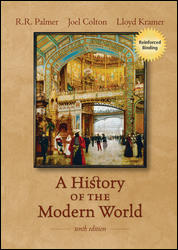
History of the Modern World, 10th Edition (Palmer)Chapter 24: Empires Into Nations: Africa an the Middle East After the Second World WarChapter OverviewAt the end of World War II, the colonial powers that had once carved up Africa found themselves confronting a wave of independence movements throughout the continent. These movements would eventually free every African country, despite the resistance of the French, the British, and the Portuguese. The new states founded in the aftermath of the independence struggle confronted the challenge of unifying people of diverse ethnic groups into nations. Many African countries experienced dictatorship, regional conflicts and civil wars, the difficulties of economic development, and more recently, the devastation of the AIDS epidemic. In the Middle East, a new sense of identity emerged from the ashes of colonialism, although the contradictions between modernization and Islamic fundamentalism brought tensions to a boil in more than one country. The creation of a Jewish homeland in Palestine brought the entire region into conflict with the new state of Israel. By the end of the twentieth century, few of the countries in these regions had successfully undergone the transition to democracy and or found the prosperity promised by development. Indeed, the entire notion of development came under fire at the end of the century as it became apparent that development initiatives had done little to reduce poverty worldwide. |  |















